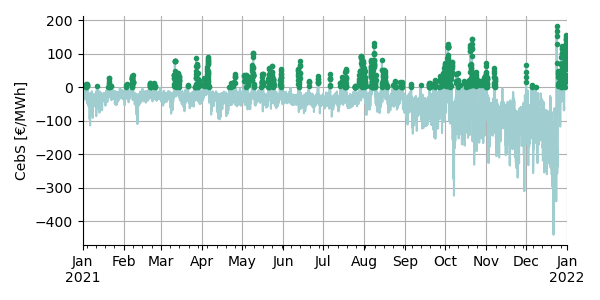Opportunities in the EU energy crisis – part 2
In our previous blog post we teased with opportunities in the EU energy crisis. Haven’t read it yet? Take a look here. Otherwise, enjoy this post on arbitrage with multi-energy systems!
Arbitrage with multi-energy systems
With the addition of an electrical alternative to an existing system, a so called multi-energy system arises. Upcycled waste heat by use of an electric high temperature heat pump can be fed into the process, replacing part of the gas heating. Or an electrode boiler can take over part of the steam production from the gas boiler. But when should the electrode boiler be operated or when is it more profitable to switch to gas heating?
Here the arbitrage comes in. Similar to a Clean Spark Spread (CSS), which is the margin a gas power plant can make by converting gas into electricity, a Clean e Spread (CeS) can be defined for a multi-energy system. For example, a Clean e-boiler Spread (CebS) can be defined as the margin which can be made by operating the electrode boiler instead of the gas boiler. During moments with a positive CebS, the electrode boiler will be operated, while during moments with a negative CebS the electrode boiler will be put in idle mode and the gas boiler takes over.
Such a CeS can be calculated on a real-time basis, taking into account the fluctuating gas and electricity prices, as well as the system specifics such as efficiencies or technical specificities of the installation.

In the figure above, the CebS is calculated for a fictitious system with a generic gas boiler and electrode boiler based on the TTF gas market, EU ETS market and the Belgian day ahead spot market. In 2021, more than 1000 hours with a positive CebS were recorded. The moments with positive CebS are not spread equally throughout the year. For example, in November and the first half of December moments with positive CebS are scarce while during the last week of December the electrode boiler would be used almost continuously. Electricity scarcity fears were responsible for the idling of the electrode boiler in November and first half of December. The last week of December typically sees a lower electricity consumption, which was even pushed more down due to extremely warm weather. Bonus for operating the electrode boiler.
A multi-energy system creates cost-saving opportunities by switching to the least expensive energy on the right moments. To do so, an arbitrage controller, or a so called dispatch tool, is required, optimising and controlling the specific energy system. Additional revenues can be generated, or in case of an investment decision still to be made, they can bring the needed upside to push the business case above the minimal profitability threshold.
Early failure detection for biomass power plants
Green Hydrogen is the new gold (without even having to dig)
NPV of a business case – common pitfalls
The Net Present Value (NPV) method is widely known and used throughout the industry to underpin investment decisions …